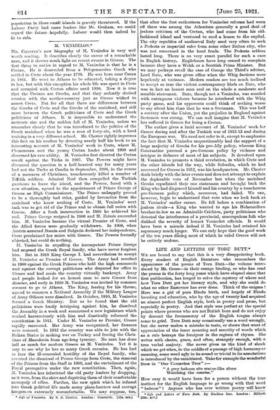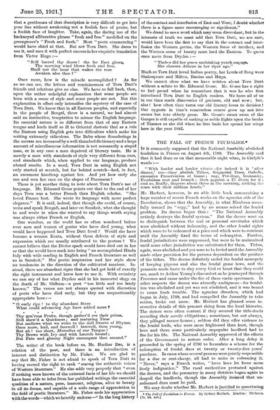LIFE AND LETTERS OF TORE DUTT.* Wz are bound to
say that this is a very disappointing book. Every student of English literature who remembers the appearance of the poems of Torn Dutt—the volume intrc- duencl by Mr. Gosse—in their orange binding, or who has read the poems in the forty long years which have, elapsed since that first publication, has longed to solve, the mystery of where and how Tons Dull got-her literary style, and why-she could do what no other Easterner has ever done. Think of the•enigma ! Here was a girl of pure Hindu birth, and largely of Hindu breeding and education, who by the age of twenty had acquired an almost perfect English -style, both in poetry and prose, but especially in poetry. And that style was perfect at the special points where persons who are not British born and do not:enjoy by descent the freemasonry of the English tongue always come to grief. Torn Dutt may oceasicaudly-use a word wrongly, but she never makes a mistake in taste, or shows that want of appreciation of the inner meaning and sanctity of words which as a rule betrays the foreigner in the regions of rhyme. She writes with charm, grace, and often, strangely enough, with a true verbal majesty. She never gives us 'the kind of -shock which we get when, in the middleef a pacisage of high harmony or meaning, some word ugly in its -sound or trivial in its associations is introduced by the uninitiated. Take for example the wonderful limes• in "Our Casuarina Tree" :-
" A grey baboon sits statue-Mee alone Watching the sunrise."
How easy it would have been for a person -without the true instinct for the English language to go wrong with that word " baboon" Anyone who has ever written poetry will know • Life and Letters of Toru Dutt. BY Eatihan Des. London: idgford. 126e. net.] that a gentleman of that description is very difficult to get into your line without awakening not a foolish face of praise, but a foolish face of laughter. Take, again, the •daring use of the 'hackneyed 'alliterative phrase "fresh and free " modelled on the greengrocer's " Fresh and fresh." Most " poets commencing " would have shied at that. But not Toni Dutt. She dares to use it; and uses it with perfect sueceseinb.er exquisite translation from Victor Hugo :—
" Still barred thy doom ! the far East glows, The morning wind blower fresh and' free. Shall not the• hour that wakes the rose Awaken also thee ? "
Once more, how is the miracle accomplished ? As far as we can see, the letters and reminiscences of Tern DOtt'S friends and relations give no clue. We have to fallback, then, -upon the rather unhelpful explanation that some people are born with a sense of style and some people are not. But this explanation in effect only intensifies the mystery of the case of Torn Dutt. We know-that in all Eastern peoples, and especially in the people of Bengal, there is a natural, we had almost said an instinctive, temptation to misuse the English language. Its essential nature is so different from that of any Eastern tongue and lends itself so ill to Oriental rhetoric that as a rule the Eastern using English gets into difficulties which make his writing extremely ridiculous. The Babu whose flounderings in the morass are increased by a well-thumbed dictionary and a large amount of miscellaneous information is not necessarily a stupid man, or in any case a man deprived of literary taste. He is merely a man with standards of -style very different from ours, and standards which, when applied to our language, produce absurd results. In a word, Toni Dutt in using English not enly started at scratch, but far behind scratch—had, in fact, an enormous handicap against her. And yet how early she ran and won her race on the slopes of Parnassus !
There is yet another thing to note about Torn Dutt's use of language. Mr. Edmund Gosse points out that to the end of her days Toni was a better French than English scholar. "She loved France best. She wrote its language with more perfect elegance." It is said, indeed, that though she could, of course, write and speak Bengali, and later on Sanskrit, what she thought in and wrote in when she wanted to say things worth saying was always either French or English.
One wonders, as the world has so often wondered before over men and women of- genius who have died young, what would have happened had Torts Dutt lived ? Would site have become a woman Keats, without those defects of style and expression which aro usually attributed to the poetess ? We cannot believe that the Divine spark would have died out in her or that she would have sunk into being " an accomplished Hindu lady with wide reading in English and French literature as well as in Sanskrit." Her poetic inspiration and her style show no tendencies in the direction of the cultivated amateur. In- stead, there are abundant signs that she had got hold of exactly the right instrument and knew how to use it. With certainty we can say of her what Dryden said in his immortal elegy on the death of Mr. Oldham—a poet "too little and too lately known." The verses are not always quoted with discretion of poets who have died early, but they are unquestionably appropriate here:—
"0 early ripe ! to thy abundant. Store What could advancing Age have added more ?.
• • •
Thy gen'rous Fruits, though gather'd ere their prime,
Still slimed a Quickness Pand maturing Time But mellows. what we write to the dull Sweets of Rhyme. Onea more, hail, and farewell! farewell, thou young, But ah ! too short, .Mareellus of our Tongue I Thy Brows with Ivy:and 'with Laurels bound; But Fate and gloomy Night encompass thee around."
The writer of the book before us, Mr. Harihar Das, is a relation of the peek and these is an introduction of interest and distinction by Mr. Fisher. We are glad to say that Mr. Fisher is not afraid to speak of Tons Dutt as having earned the right to rank " among the authentic voices of Western literature." He also adds very properly•that "even if nothing were known of the external facts of her life we should have been able to infer from her published writings the essential qualities of a nature, pure, innocent, religious, alive to beauty in all its forms, and capable of a wide range of appreciation in the field of poetic literature." Mr. Fisher ends his appreciation With the words—which we heartily endorse--" In the long history of thecontaot andinterfusion of East and West; I doubt-whether there-is a . figure more encouraging . or significant."
We dread to uses word which may seem discordant, but in the interests of truth we must add that Toru. Dutt, we are sure, would have been the first to say that in the -contact and inter. fusion the Western. genius, the Western force of: intellect, and the Western sense of beauty must lead the Eastern: To quote once. more. from Dryden :— " Thebes did her green unthinking youth engage. She chooses :Athens. its. her riper age."
Michas. Torn Dutt loved -Indian poetry, her Lords of Song wore Shakespeare ,and Milton, Racine and. Hugo.
We cannot: close what we have written about Torn Dutt without a mita° to Mr. Edmund Game. Mr..G-osse -has a sight to feel:pread. when he remembers that it was he who first introduced Tons Dutt: to English readers. We have all of us in our. time:made discoveries of geniuses, old and new; but; alas ! how often, time turns our old 'literary loves to derision I Our. cygnets in time's remorseless course grow up not into swans - but into elderly geese. Mr. Gorse's sweet swan of • the Ganges is still capable of making-as noble- flights upon the banks of Thames, as she did when he first bade her spread her wings here in the year 1582.



































 Previous page
Previous page